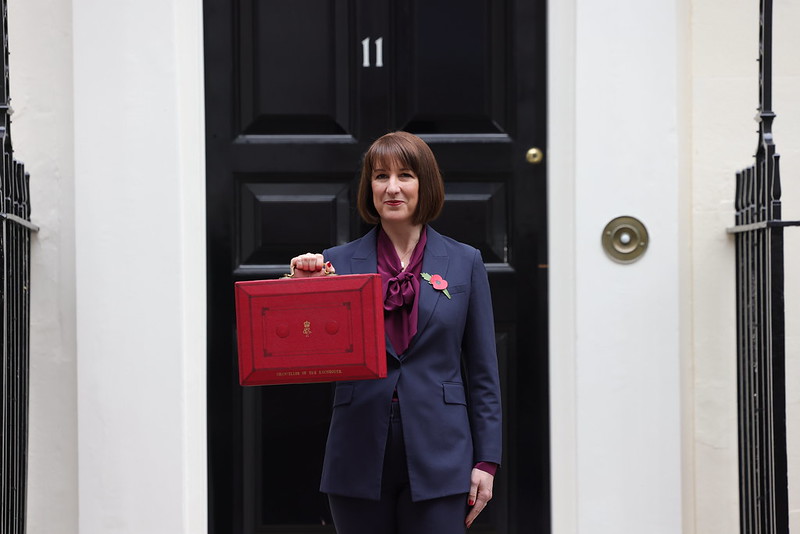
The Chancellor fired the starting gun on the government’s drive for growth – and building homes to provide jobs and house new workers – is a key part of the puzzle.
Rachel Reeves said this was a Budget to “fix the foundations” of the UK economy, adding that Labour had been called to do this before when it set up the NHS in 1945 and during Harold Wilson’s push to harness the “white heat of technology” in the 1960s.
She promised to “boost to public investment by over £100bn over the next five years across roads, rail, schools and hospitals while keeping debt on a downward path”.
Funding for homes
The government set out plans for a new housing package that will include £500m for the Affordable Homes Programme, increasing it to £3.1bn, which it said was “the biggest annual budget for affordable housing in over a decade”.
It said this brings total investment in housing supply to over £5bn to support “the delivery of tens of thousands of new homes”.
The Budget provided £3bn to small firms and the build-to-rent sector by expanding existing housing guarantee schemes to support a strong and diverse private housing market.
But housebuilders are wary of building 300,000 homes a year, which is what is required to match the government’s target of providing 1.5 million homes over the next five years. The country built around 1 million homes over the last five years.
Barratt Redrow chief executive David Thomas said: “Government has put homebuilding at the heart of its economic plans so recruiting and training more planners, reforming the planning system and investing in affordable housing, will all help to get Britain building.
“However, if the UK is to build the number of new homes it needs at the pace that it needs them, there needs to be stronger support for customers too.”
Stamp duty surprise
The most immediately eye-catching move in the Budget is lifting the stamp duty surcharge on second homes and buy-to-let properties from 3% to 5%, from tomorrow.
Landlord bodies say BTL owners have been selling properties over the last year to avoid tax changes aimed at them, and this measure is designed to catch property investors about to sell, or who are in the middle of that process.
Reeves said: “This will support over 130,000 additional transactions from people buying their first home, or moving home, over the next five years.”
But National Residential Landlords Association chief executive Ben Beadle said: “Hiking stamp duty on homes to rent when 21 people are chasing every rental property makes no sense.
“Analysis by Capital Economics has found that increasing stamp duty on rental properties from three to five per cent will see a net loss of half a million homes to rent over 10 years.”
Inheritance and capital gains taxes
The Chancellor also confirmed that the government would extend the current inheritance tax threshold freeze for a further two years to 2030.
This means the first £325,000 of any estate can be inherited tax-free, rising to £500,000 if the estate includes a residence passed to direct descendants, and £1m when a tax-free allowance is passed to a surviving spouse or civil partner.
This is projected to raise would raise over £2bn and will affect 6% of estates.
But Quilter tax and financial planning expert Rachael Griffin said: “The decision to continue the freeze on the inheritance tax nil rate band £325,000 will pull many more estates, which many would consider relatively modest, into the inheritance tax net.
“The nil rate band has been frozen since 2009 and if it had risen in line with inflation, it should now be £503,879 so freezing this until 2030 will make this threshold even more antiquated.
“We are already seeing record-breaking inheritance tax receipts, and this change will compound this.”
However, Reeves said that capital gains tax rates on residential property would remain at 18% and 24%, at the higher and lower thresholds.
Although, capital gains on other assets, such as shares or company sales would rise from 10% to 18%, and the higher rate from 20% to 24%.
SPF Private Clients chief executive Mark Harris said the move may keep some landlords from thinning their portfolios.
Harris said: “The decision to keep capital gains tax at the same levels for property sales is welcome and will hopefully stave off any panic selling.”
However, kick-starting growth comes at a cost. The Treasury is set to raise taxes by £40bn, with a large chunk coming from employer’s national insurance contributions.
This takes the UK, after tax rises as a result of the pandemic, closer to European levels of taxation.
To pay this bill, trains have to run on time and firms have to employ more workers.



